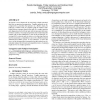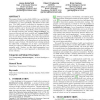7228 search results - page 16 / 1446 » From Algorithmic to Subjective Randomness |
74
Voted
ATAL
2009
Springer
15 years 5 months ago
2009
Springer
In large, collaborative, heterogeneous teams, team members often collect information that is useful to other members of the team. Recognizing the utility of such information and d...
114
click to vote
3DOR
2008
15 years 1 months ago
2008
Mesh analysis and clustering have became important issues in order to improve the efficiency of common processing operations like compression, watermarking or simplification. In t...
SIGECOM
2006
ACM
15 years 5 months ago
2006
ACM
Braess’s Paradox is the counterintuitive but well-known fact that removing edges from a network with “selfish routing” can decrease the latency incurred by traffic in an eq...
SIGIR
2006
ACM
15 years 5 months ago
2006
ACM
We present a novel framework for answering complex questions that relies on question decomposition. Complex questions are decomposed by a procedure that operates on a Markov chain...
ATAL
2008
Springer
15 years 1 months ago
2008
Springer
We propose Markov random fields (MRFs) as a probabilistic mathematical model for unifying approaches to multi-robot coordination or, more specifically, distributed action selectio...


